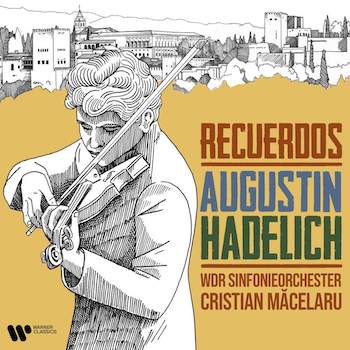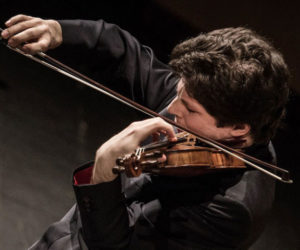Classical Music Review: Violinist Augustin Hadelich’s “Recuerdos”
By Jonathan Blumhofer
Augustin Hadelich has the feeling of this music — its bittersweet melodic phrases, dancing riffs, and restrained passion — well in hand.
 After a slow start, Benjamin Britten’s Violin Concerto seems to have come in from the cold. To think: since Lydia Mordkovitch’s 2001 account of the piece with Richard Hickox, there have been over a dozen major releases of the score featuring some of the finest soloists of the day (including Maxim Vengerov, Tasmin Little, Arabella Steinbacher, Frank Peter Zimmermann, Daniel Hope, Alina Ibragimova, and James Ehnes). Its most recent champion is Augustin Hadelich, whose album, Recuerdos, celebrates violin music with a Spanish connection.
After a slow start, Benjamin Britten’s Violin Concerto seems to have come in from the cold. To think: since Lydia Mordkovitch’s 2001 account of the piece with Richard Hickox, there have been over a dozen major releases of the score featuring some of the finest soloists of the day (including Maxim Vengerov, Tasmin Little, Arabella Steinbacher, Frank Peter Zimmermann, Daniel Hope, Alina Ibragimova, and James Ehnes). Its most recent champion is Augustin Hadelich, whose album, Recuerdos, celebrates violin music with a Spanish connection.
Britten’s 1939 score boasts that, to be sure. Written in part to express the pacifist composer’s despair at the Spanish Civil War, it was premiered in New York City by the Spanish violinist Antonio Brosa, and more than a few of the gestures in its opening movement clearly suggest Mediterranean, if not explicitly Iberian, languor.
Hadelich has the feeling of this music — its bittersweet melodic phrases, dancing riffs, and restrained passion — well in hand. Also its fearsome combinations of notes: he navigates Britten’s furiously difficult writing with astonishing precision and (seeming) ease. It shouldn’t come as much of a surprise, then, that, for formal and emotional rigor, Hadelich’s performance is clearly and smartly shaped, especially the culminating Passacaglia, which builds to a nobly devastating apex.
Those same characteristics are largely to be found, as well, in Hadelich’s reading of the Prokofiev Violin Concerto No. 2. Here, the clarity of the violinist’s fingerwork, the warmth of his tone, the intensity of his vibrato (especially in the instrument’s highest regions) are nothing short of astonishing.
True, what’s occasionally missing is a bit of an edge to his attack or sense of menace, especially in the finale, which sounds a touch genteel. But the way Hadelich places the melodic line front-and-center in the first two movements is magnificent.
In both concerti, the virtuoso is joined by Cristian Macelaru and the WDR Sinfonieorchester. They’re often a solid pairing, though, in the Britten, Mstislav Rostropovich and Edward Gardner made more of the dynamic extremes and structural shape of the orchestral writing in their respective recordings. Even so, there’s a good bit of sympathy on offer between soloist and ensemble, and in neither piece is the violin covered by the larger group.

Violinist Augustin Hadelich. Photo: Luca Valentina
One wouldn’t have minded a little bit of the last, though, in the opener, Pablo de Sarasate’s Carmen Fantasy, not so much on account of Hadelich’s playing (which is polished to a high sheen) but because, as recorded here, the orchestral part sounds remarkably anemic. True, the Fantasy is no masterpiece: it’s a showstopper.
But it needn’t sound like nothing more consequential than a playful romp. Just listen to the richly operatic flair Itzhak Perlman brought to the solo line and the compensatory virtuosity and theatrical knowhow Zubin Mehta and the New York Philharmonic mined from the pedestrian orchestral writing back in the ’80s: they made the piece a blast. Here, not so much.
That said, a trivial triviality is a small complaint: the Prokofiev and, especially, Britten have much to recommend them. So does Hadelich’s encore of Ruggiero Ricci’s arrangement of Recuerdos de la Alhambra, in all its shimmering glory. There we’ve got a showpiece that does, in fact, seem to add up to more than the sum of its parts.
Jonathan Blumhofer is a composer and violist who has been active in the greater Boston area since 2004. His music has received numerous awards and been performed by various ensembles, including the American Composers Orchestra, Kiev Philharmonic, Camerata Chicago, Xanthos Ensemble, and Juventas New Music Group. Since receiving his doctorate from Boston University in 2010, Jon has taught at Clark University, Worcester Polytechnic Institute, and online for the University of Phoenix, in addition to writing music criticism for the Worcester Telegram & Gazette.
